Nursing Assignment: Congestive Cardiac Failure Analysis and Plan
VerifiedAdded on 2023/04/21
|12
|2871
|230
Homework Assignment
AI Summary
This nursing assignment analyzes a case study of a 77-year-old patient, Mrs. Sharon McKenzie, diagnosed with congestive cardiac failure. The assignment begins with an outline of the disease, its causes (including coronary artery disease, hypertension, and chronic obstructive pulmonary disease), incidence, and risk factors (such as obesity, smoking, and high cholesterol), as well as the impact of the disease on both the patient and their family. It then delves into the common signs and symptoms of congestive heart failure, particularly shortness of breath, edema (swollen ankles), and irregular heartbeat, along with their underlying pathophysiology. The assignment also examines the pharmacodynamics and pharmacokinetics of Digoxin, a medication prescribed to the patient. Finally, it presents a comprehensive nursing care plan for Mrs. McKenzie, addressing problems such as increased blood pressure, shortness of breath, swollen ankles, nausea, dizziness, and cold feet, including goals, interventions (such as medication, breathing techniques, and supplemental oxygen), and rationales for each intervention, along with evaluation methods. The assignment references several research articles to support its findings and recommendations.
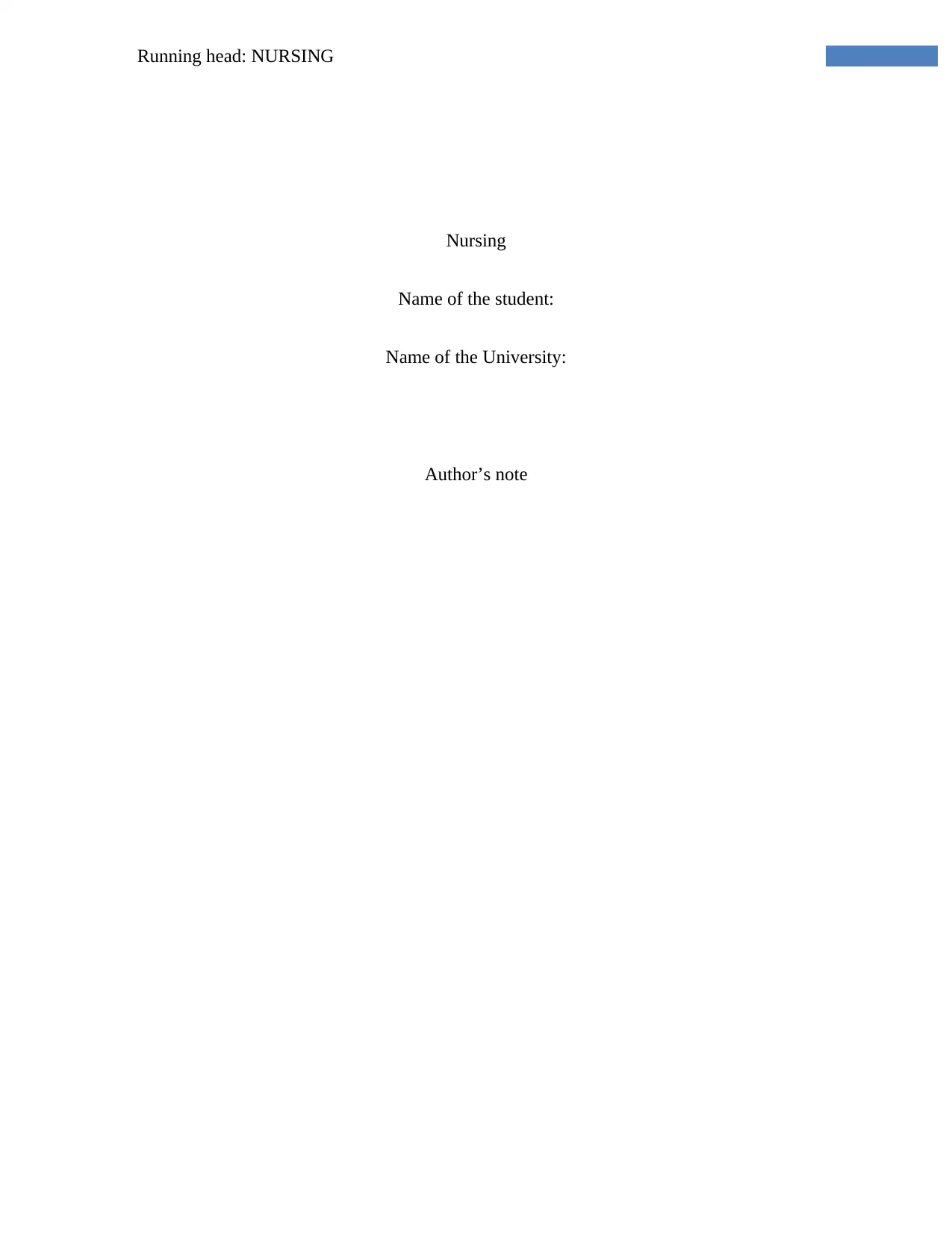
Running head: NURSING
Nursing
Name of the student:
Name of the University:
Author’s note
Nursing
Name of the student:
Name of the University:
Author’s note
Paraphrase This Document
Need a fresh take? Get an instant paraphrase of this document with our AI Paraphraser
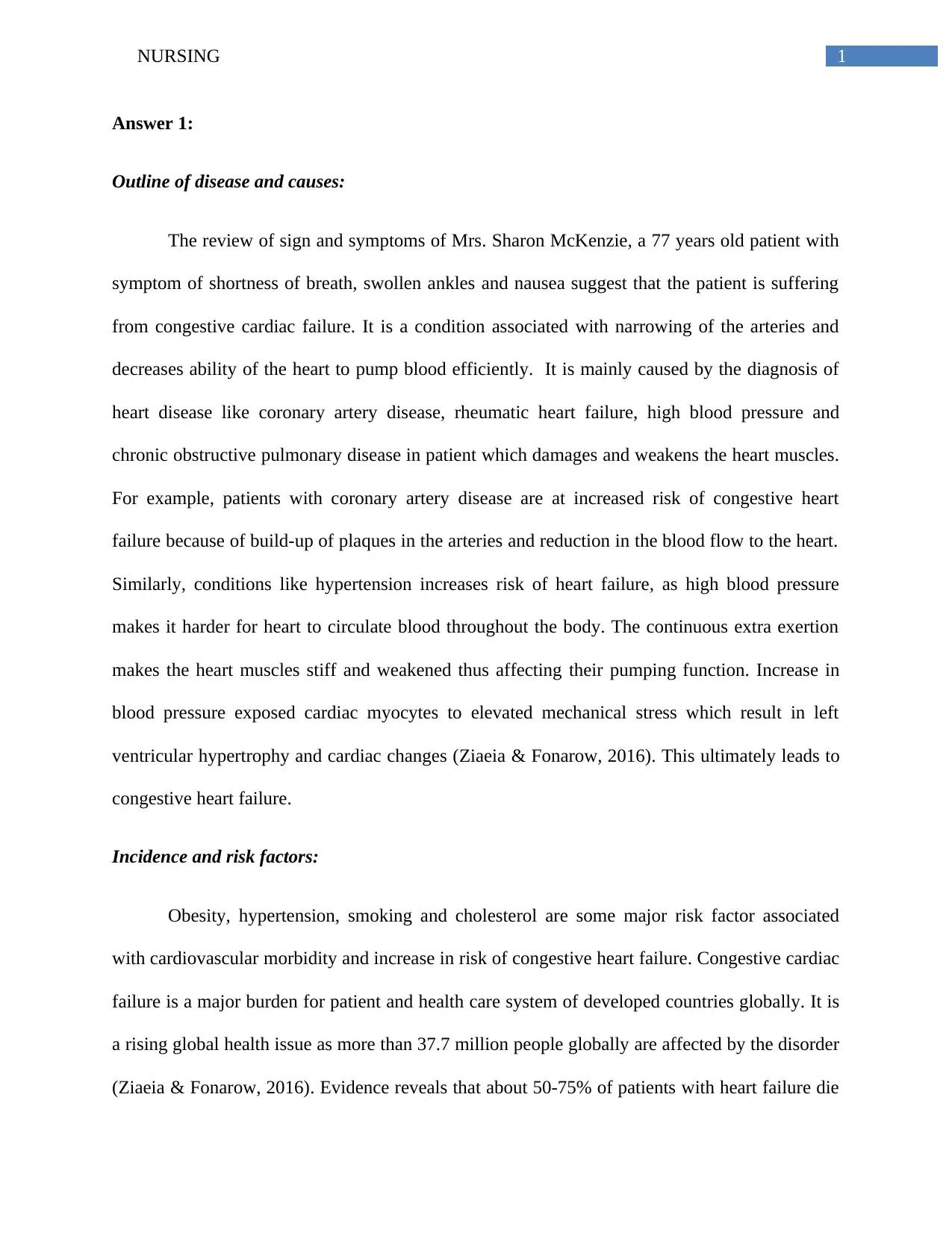
1NURSING
Answer 1:
Outline of disease and causes:
The review of sign and symptoms of Mrs. Sharon McKenzie, a 77 years old patient with
symptom of shortness of breath, swollen ankles and nausea suggest that the patient is suffering
from congestive cardiac failure. It is a condition associated with narrowing of the arteries and
decreases ability of the heart to pump blood efficiently. It is mainly caused by the diagnosis of
heart disease like coronary artery disease, rheumatic heart failure, high blood pressure and
chronic obstructive pulmonary disease in patient which damages and weakens the heart muscles.
For example, patients with coronary artery disease are at increased risk of congestive heart
failure because of build-up of plaques in the arteries and reduction in the blood flow to the heart.
Similarly, conditions like hypertension increases risk of heart failure, as high blood pressure
makes it harder for heart to circulate blood throughout the body. The continuous extra exertion
makes the heart muscles stiff and weakened thus affecting their pumping function. Increase in
blood pressure exposed cardiac myocytes to elevated mechanical stress which result in left
ventricular hypertrophy and cardiac changes (Ziaeia & Fonarow, 2016). This ultimately leads to
congestive heart failure.
Incidence and risk factors:
Obesity, hypertension, smoking and cholesterol are some major risk factor associated
with cardiovascular morbidity and increase in risk of congestive heart failure. Congestive cardiac
failure is a major burden for patient and health care system of developed countries globally. It is
a rising global health issue as more than 37.7 million people globally are affected by the disorder
(Ziaeia & Fonarow, 2016). Evidence reveals that about 50-75% of patients with heart failure die
Answer 1:
Outline of disease and causes:
The review of sign and symptoms of Mrs. Sharon McKenzie, a 77 years old patient with
symptom of shortness of breath, swollen ankles and nausea suggest that the patient is suffering
from congestive cardiac failure. It is a condition associated with narrowing of the arteries and
decreases ability of the heart to pump blood efficiently. It is mainly caused by the diagnosis of
heart disease like coronary artery disease, rheumatic heart failure, high blood pressure and
chronic obstructive pulmonary disease in patient which damages and weakens the heart muscles.
For example, patients with coronary artery disease are at increased risk of congestive heart
failure because of build-up of plaques in the arteries and reduction in the blood flow to the heart.
Similarly, conditions like hypertension increases risk of heart failure, as high blood pressure
makes it harder for heart to circulate blood throughout the body. The continuous extra exertion
makes the heart muscles stiff and weakened thus affecting their pumping function. Increase in
blood pressure exposed cardiac myocytes to elevated mechanical stress which result in left
ventricular hypertrophy and cardiac changes (Ziaeia & Fonarow, 2016). This ultimately leads to
congestive heart failure.
Incidence and risk factors:
Obesity, hypertension, smoking and cholesterol are some major risk factor associated
with cardiovascular morbidity and increase in risk of congestive heart failure. Congestive cardiac
failure is a major burden for patient and health care system of developed countries globally. It is
a rising global health issue as more than 37.7 million people globally are affected by the disorder
(Ziaeia & Fonarow, 2016). Evidence reveals that about 50-75% of patients with heart failure die
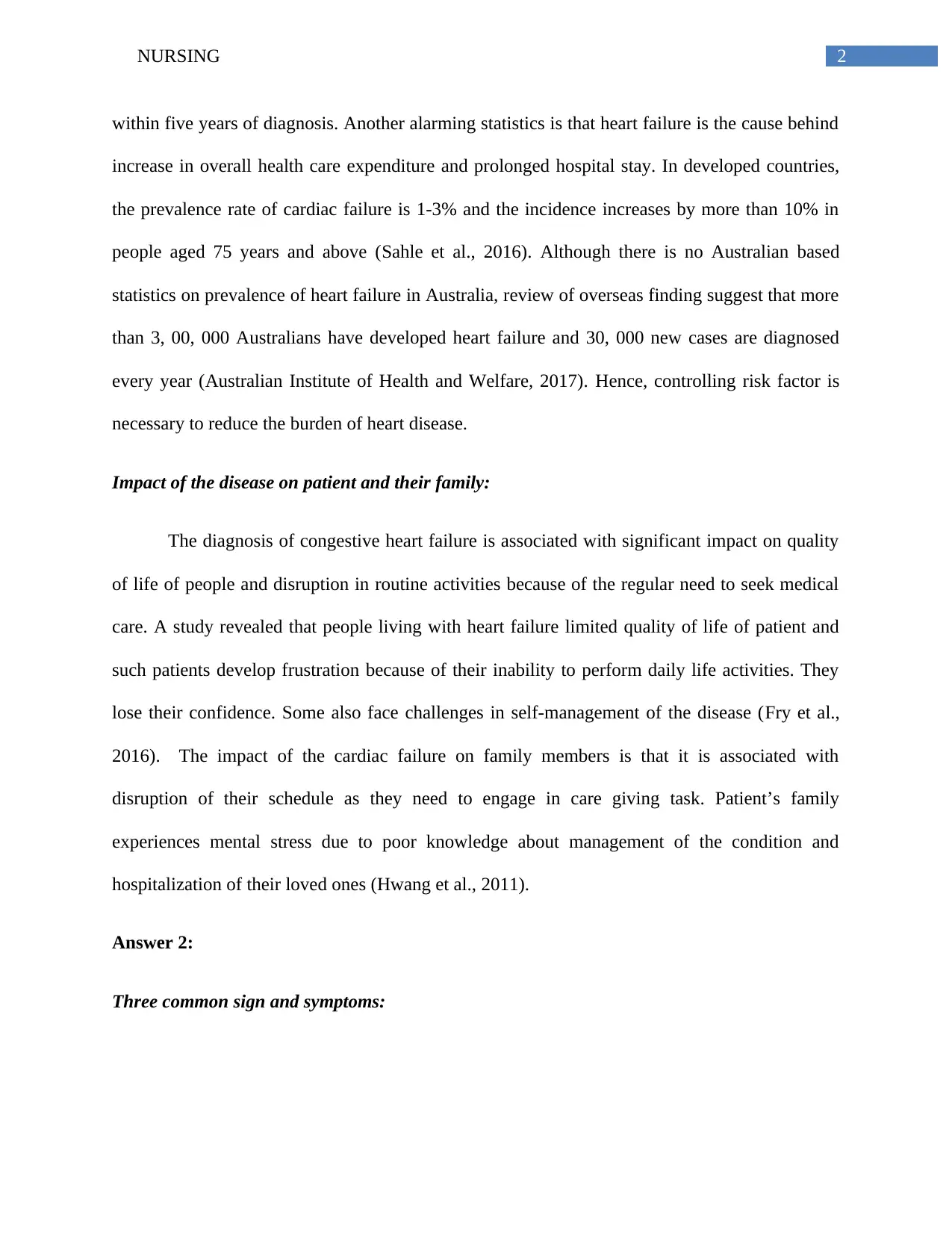
2NURSING
within five years of diagnosis. Another alarming statistics is that heart failure is the cause behind
increase in overall health care expenditure and prolonged hospital stay. In developed countries,
the prevalence rate of cardiac failure is 1-3% and the incidence increases by more than 10% in
people aged 75 years and above (Sahle et al., 2016). Although there is no Australian based
statistics on prevalence of heart failure in Australia, review of overseas finding suggest that more
than 3, 00, 000 Australians have developed heart failure and 30, 000 new cases are diagnosed
every year (Australian Institute of Health and Welfare, 2017). Hence, controlling risk factor is
necessary to reduce the burden of heart disease.
Impact of the disease on patient and their family:
The diagnosis of congestive heart failure is associated with significant impact on quality
of life of people and disruption in routine activities because of the regular need to seek medical
care. A study revealed that people living with heart failure limited quality of life of patient and
such patients develop frustration because of their inability to perform daily life activities. They
lose their confidence. Some also face challenges in self-management of the disease (Fry et al.,
2016). The impact of the cardiac failure on family members is that it is associated with
disruption of their schedule as they need to engage in care giving task. Patient’s family
experiences mental stress due to poor knowledge about management of the condition and
hospitalization of their loved ones (Hwang et al., 2011).
Answer 2:
Three common sign and symptoms:
within five years of diagnosis. Another alarming statistics is that heart failure is the cause behind
increase in overall health care expenditure and prolonged hospital stay. In developed countries,
the prevalence rate of cardiac failure is 1-3% and the incidence increases by more than 10% in
people aged 75 years and above (Sahle et al., 2016). Although there is no Australian based
statistics on prevalence of heart failure in Australia, review of overseas finding suggest that more
than 3, 00, 000 Australians have developed heart failure and 30, 000 new cases are diagnosed
every year (Australian Institute of Health and Welfare, 2017). Hence, controlling risk factor is
necessary to reduce the burden of heart disease.
Impact of the disease on patient and their family:
The diagnosis of congestive heart failure is associated with significant impact on quality
of life of people and disruption in routine activities because of the regular need to seek medical
care. A study revealed that people living with heart failure limited quality of life of patient and
such patients develop frustration because of their inability to perform daily life activities. They
lose their confidence. Some also face challenges in self-management of the disease (Fry et al.,
2016). The impact of the cardiac failure on family members is that it is associated with
disruption of their schedule as they need to engage in care giving task. Patient’s family
experiences mental stress due to poor knowledge about management of the condition and
hospitalization of their loved ones (Hwang et al., 2011).
Answer 2:
Three common sign and symptoms:
⊘ This is a preview!⊘
Do you want full access?
Subscribe today to unlock all pages.

Trusted by 1+ million students worldwide
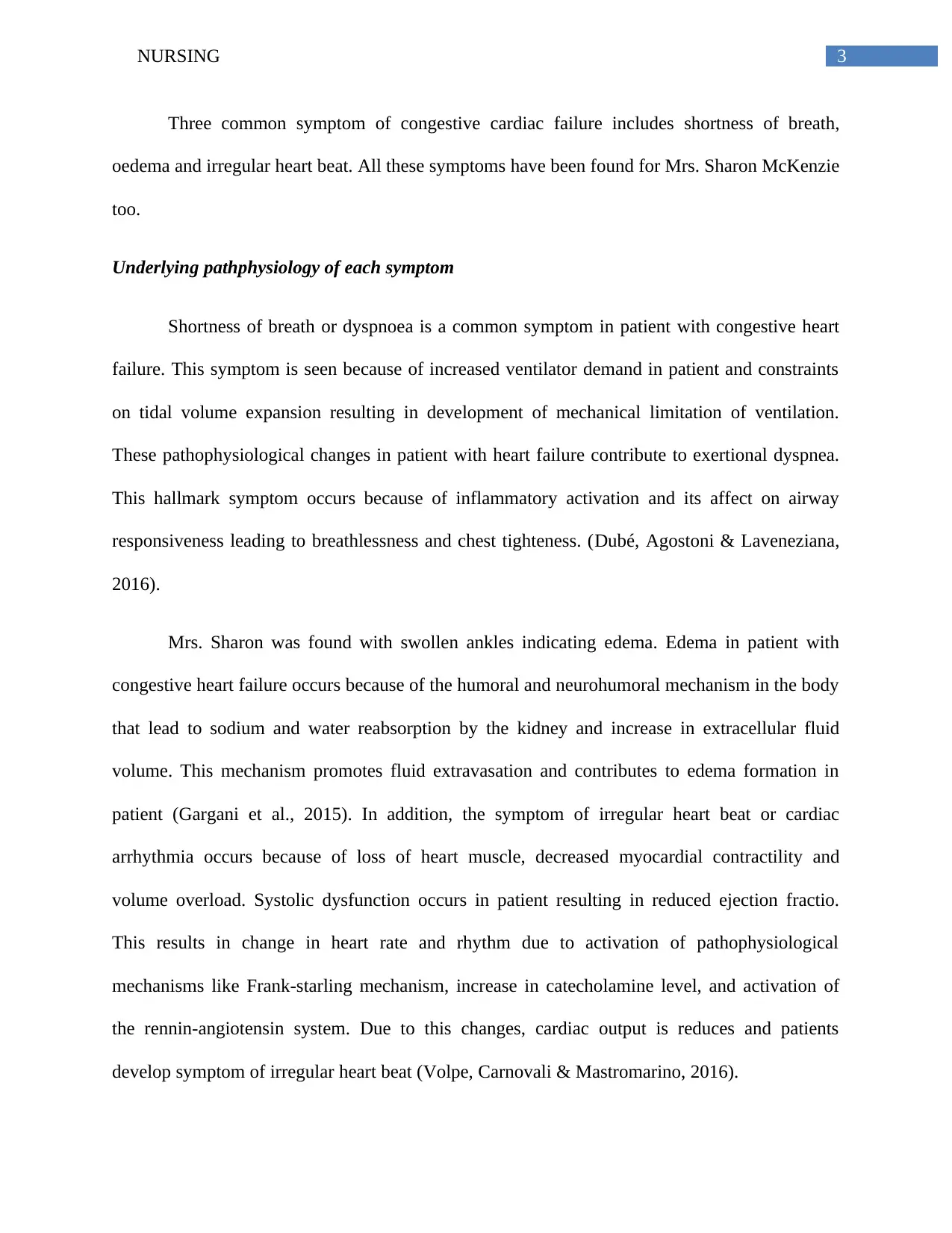
3NURSING
Three common symptom of congestive cardiac failure includes shortness of breath,
oedema and irregular heart beat. All these symptoms have been found for Mrs. Sharon McKenzie
too.
Underlying pathphysiology of each symptom
Shortness of breath or dyspnoea is a common symptom in patient with congestive heart
failure. This symptom is seen because of increased ventilator demand in patient and constraints
on tidal volume expansion resulting in development of mechanical limitation of ventilation.
These pathophysiological changes in patient with heart failure contribute to exertional dyspnea.
This hallmark symptom occurs because of inflammatory activation and its affect on airway
responsiveness leading to breathlessness and chest tighteness. (Dubé, Agostoni & Laveneziana,
2016).
Mrs. Sharon was found with swollen ankles indicating edema. Edema in patient with
congestive heart failure occurs because of the humoral and neurohumoral mechanism in the body
that lead to sodium and water reabsorption by the kidney and increase in extracellular fluid
volume. This mechanism promotes fluid extravasation and contributes to edema formation in
patient (Gargani et al., 2015). In addition, the symptom of irregular heart beat or cardiac
arrhythmia occurs because of loss of heart muscle, decreased myocardial contractility and
volume overload. Systolic dysfunction occurs in patient resulting in reduced ejection fractio.
This results in change in heart rate and rhythm due to activation of pathophysiological
mechanisms like Frank-starling mechanism, increase in catecholamine level, and activation of
the rennin-angiotensin system. Due to this changes, cardiac output is reduces and patients
develop symptom of irregular heart beat (Volpe, Carnovali & Mastromarino, 2016).
Three common symptom of congestive cardiac failure includes shortness of breath,
oedema and irregular heart beat. All these symptoms have been found for Mrs. Sharon McKenzie
too.
Underlying pathphysiology of each symptom
Shortness of breath or dyspnoea is a common symptom in patient with congestive heart
failure. This symptom is seen because of increased ventilator demand in patient and constraints
on tidal volume expansion resulting in development of mechanical limitation of ventilation.
These pathophysiological changes in patient with heart failure contribute to exertional dyspnea.
This hallmark symptom occurs because of inflammatory activation and its affect on airway
responsiveness leading to breathlessness and chest tighteness. (Dubé, Agostoni & Laveneziana,
2016).
Mrs. Sharon was found with swollen ankles indicating edema. Edema in patient with
congestive heart failure occurs because of the humoral and neurohumoral mechanism in the body
that lead to sodium and water reabsorption by the kidney and increase in extracellular fluid
volume. This mechanism promotes fluid extravasation and contributes to edema formation in
patient (Gargani et al., 2015). In addition, the symptom of irregular heart beat or cardiac
arrhythmia occurs because of loss of heart muscle, decreased myocardial contractility and
volume overload. Systolic dysfunction occurs in patient resulting in reduced ejection fractio.
This results in change in heart rate and rhythm due to activation of pathophysiological
mechanisms like Frank-starling mechanism, increase in catecholamine level, and activation of
the rennin-angiotensin system. Due to this changes, cardiac output is reduces and patients
develop symptom of irregular heart beat (Volpe, Carnovali & Mastromarino, 2016).
Paraphrase This Document
Need a fresh take? Get an instant paraphrase of this document with our AI Paraphraser
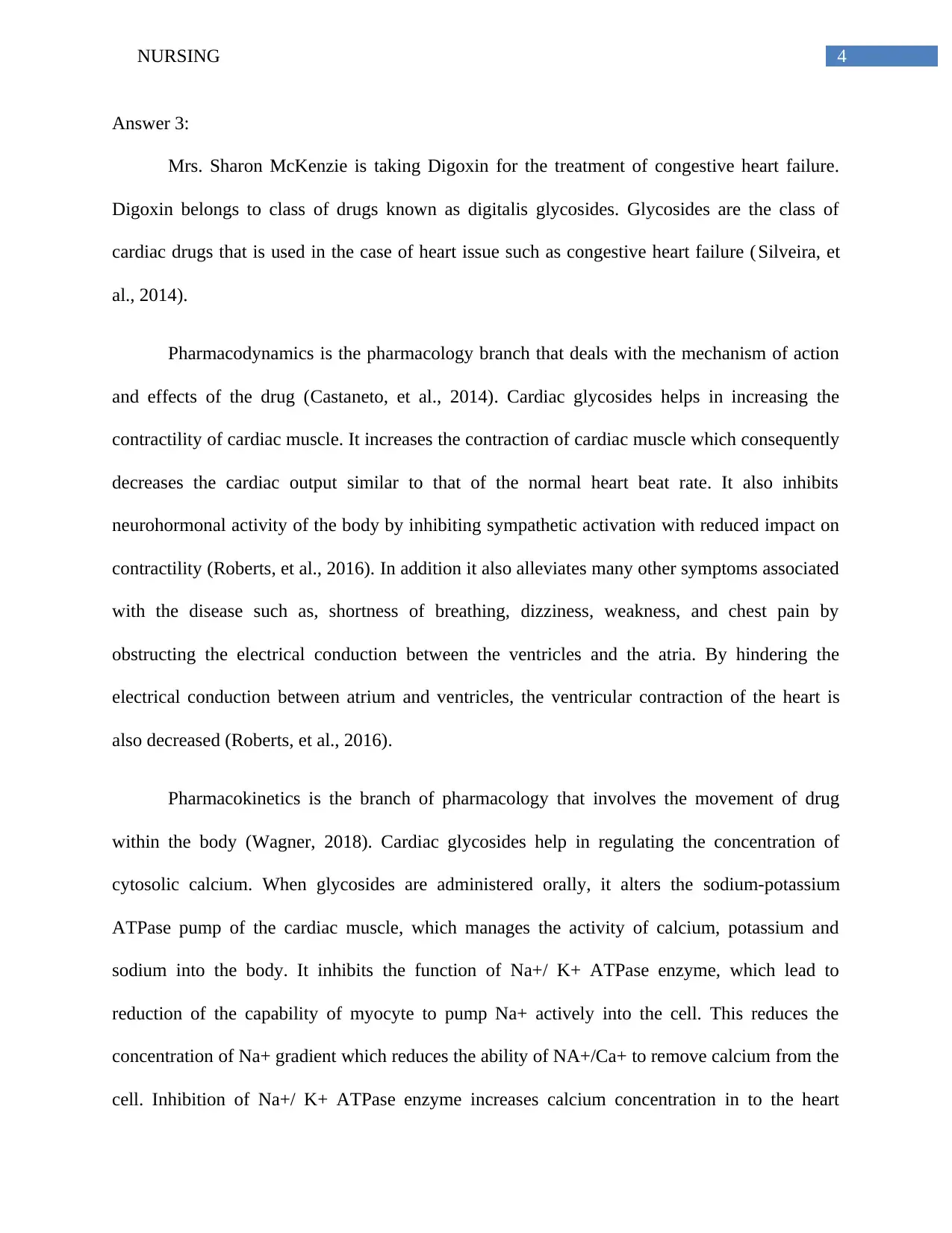
4NURSING
Answer 3:
Mrs. Sharon McKenzie is taking Digoxin for the treatment of congestive heart failure.
Digoxin belongs to class of drugs known as digitalis glycosides. Glycosides are the class of
cardiac drugs that is used in the case of heart issue such as congestive heart failure ( Silveira, et
al., 2014).
Pharmacodynamics is the pharmacology branch that deals with the mechanism of action
and effects of the drug (Castaneto, et al., 2014). Cardiac glycosides helps in increasing the
contractility of cardiac muscle. It increases the contraction of cardiac muscle which consequently
decreases the cardiac output similar to that of the normal heart beat rate. It also inhibits
neurohormonal activity of the body by inhibiting sympathetic activation with reduced impact on
contractility (Roberts, et al., 2016). In addition it also alleviates many other symptoms associated
with the disease such as, shortness of breathing, dizziness, weakness, and chest pain by
obstructing the electrical conduction between the ventricles and the atria. By hindering the
electrical conduction between atrium and ventricles, the ventricular contraction of the heart is
also decreased (Roberts, et al., 2016).
Pharmacokinetics is the branch of pharmacology that involves the movement of drug
within the body (Wagner, 2018). Cardiac glycosides help in regulating the concentration of
cytosolic calcium. When glycosides are administered orally, it alters the sodium-potassium
ATPase pump of the cardiac muscle, which manages the activity of calcium, potassium and
sodium into the body. It inhibits the function of Na+/ K+ ATPase enzyme, which lead to
reduction of the capability of myocyte to pump Na+ actively into the cell. This reduces the
concentration of Na+ gradient which reduces the ability of NA+/Ca+ to remove calcium from the
cell. Inhibition of Na+/ K+ ATPase enzyme increases calcium concentration in to the heart
Answer 3:
Mrs. Sharon McKenzie is taking Digoxin for the treatment of congestive heart failure.
Digoxin belongs to class of drugs known as digitalis glycosides. Glycosides are the class of
cardiac drugs that is used in the case of heart issue such as congestive heart failure ( Silveira, et
al., 2014).
Pharmacodynamics is the pharmacology branch that deals with the mechanism of action
and effects of the drug (Castaneto, et al., 2014). Cardiac glycosides helps in increasing the
contractility of cardiac muscle. It increases the contraction of cardiac muscle which consequently
decreases the cardiac output similar to that of the normal heart beat rate. It also inhibits
neurohormonal activity of the body by inhibiting sympathetic activation with reduced impact on
contractility (Roberts, et al., 2016). In addition it also alleviates many other symptoms associated
with the disease such as, shortness of breathing, dizziness, weakness, and chest pain by
obstructing the electrical conduction between the ventricles and the atria. By hindering the
electrical conduction between atrium and ventricles, the ventricular contraction of the heart is
also decreased (Roberts, et al., 2016).
Pharmacokinetics is the branch of pharmacology that involves the movement of drug
within the body (Wagner, 2018). Cardiac glycosides help in regulating the concentration of
cytosolic calcium. When glycosides are administered orally, it alters the sodium-potassium
ATPase pump of the cardiac muscle, which manages the activity of calcium, potassium and
sodium into the body. It inhibits the function of Na+/ K+ ATPase enzyme, which lead to
reduction of the capability of myocyte to pump Na+ actively into the cell. This reduces the
concentration of Na+ gradient which reduces the ability of NA+/Ca+ to remove calcium from the
cell. Inhibition of Na+/ K+ ATPase enzyme increases calcium concentration in to the heart
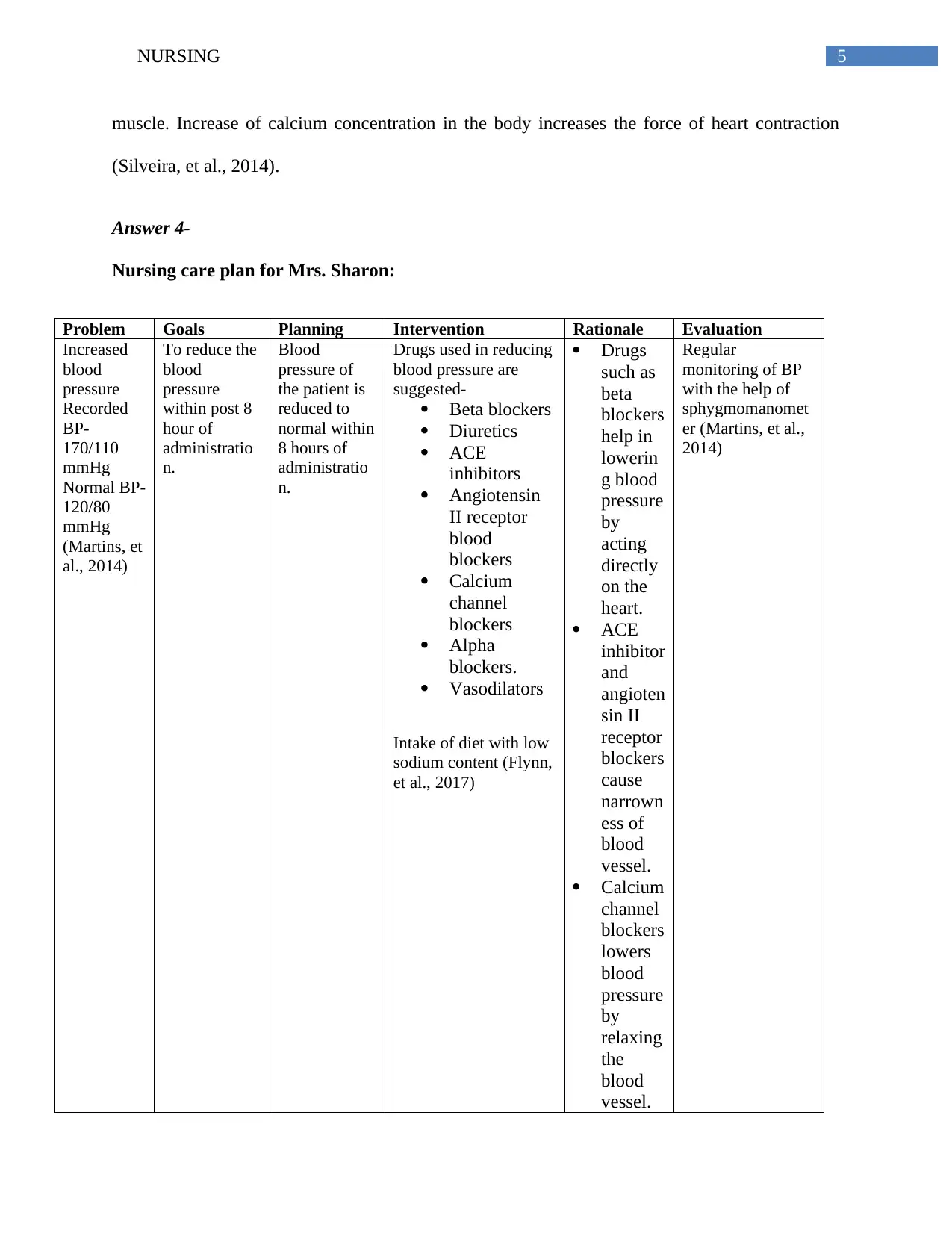
5NURSING
muscle. Increase of calcium concentration in the body increases the force of heart contraction
(Silveira, et al., 2014).
Answer 4-
Nursing care plan for Mrs. Sharon:
Problem Goals Planning Intervention Rationale Evaluation
Increased
blood
pressure
Recorded
BP-
170/110
mmHg
Normal BP-
120/80
mmHg
(Martins, et
al., 2014)
To reduce the
blood
pressure
within post 8
hour of
administratio
n.
Blood
pressure of
the patient is
reduced to
normal within
8 hours of
administratio
n.
Drugs used in reducing
blood pressure are
suggested-
Beta blockers
Diuretics
ACE
inhibitors
Angiotensin
II receptor
blood
blockers
Calcium
channel
blockers
Alpha
blockers.
Vasodilators
Intake of diet with low
sodium content (Flynn,
et al., 2017)
Drugs
such as
beta
blockers
help in
lowerin
g blood
pressure
by
acting
directly
on the
heart.
ACE
inhibitor
and
angioten
sin II
receptor
blockers
cause
narrown
ess of
blood
vessel.
Calcium
channel
blockers
lowers
blood
pressure
by
relaxing
the
blood
vessel.
Regular
monitoring of BP
with the help of
sphygmomanomet
er (Martins, et al.,
2014)
muscle. Increase of calcium concentration in the body increases the force of heart contraction
(Silveira, et al., 2014).
Answer 4-
Nursing care plan for Mrs. Sharon:
Problem Goals Planning Intervention Rationale Evaluation
Increased
blood
pressure
Recorded
BP-
170/110
mmHg
Normal BP-
120/80
mmHg
(Martins, et
al., 2014)
To reduce the
blood
pressure
within post 8
hour of
administratio
n.
Blood
pressure of
the patient is
reduced to
normal within
8 hours of
administratio
n.
Drugs used in reducing
blood pressure are
suggested-
Beta blockers
Diuretics
ACE
inhibitors
Angiotensin
II receptor
blood
blockers
Calcium
channel
blockers
Alpha
blockers.
Vasodilators
Intake of diet with low
sodium content (Flynn,
et al., 2017)
Drugs
such as
beta
blockers
help in
lowerin
g blood
pressure
by
acting
directly
on the
heart.
ACE
inhibitor
and
angioten
sin II
receptor
blockers
cause
narrown
ess of
blood
vessel.
Calcium
channel
blockers
lowers
blood
pressure
by
relaxing
the
blood
vessel.
Regular
monitoring of BP
with the help of
sphygmomanomet
er (Martins, et al.,
2014)
⊘ This is a preview!⊘
Do you want full access?
Subscribe today to unlock all pages.

Trusted by 1+ million students worldwide
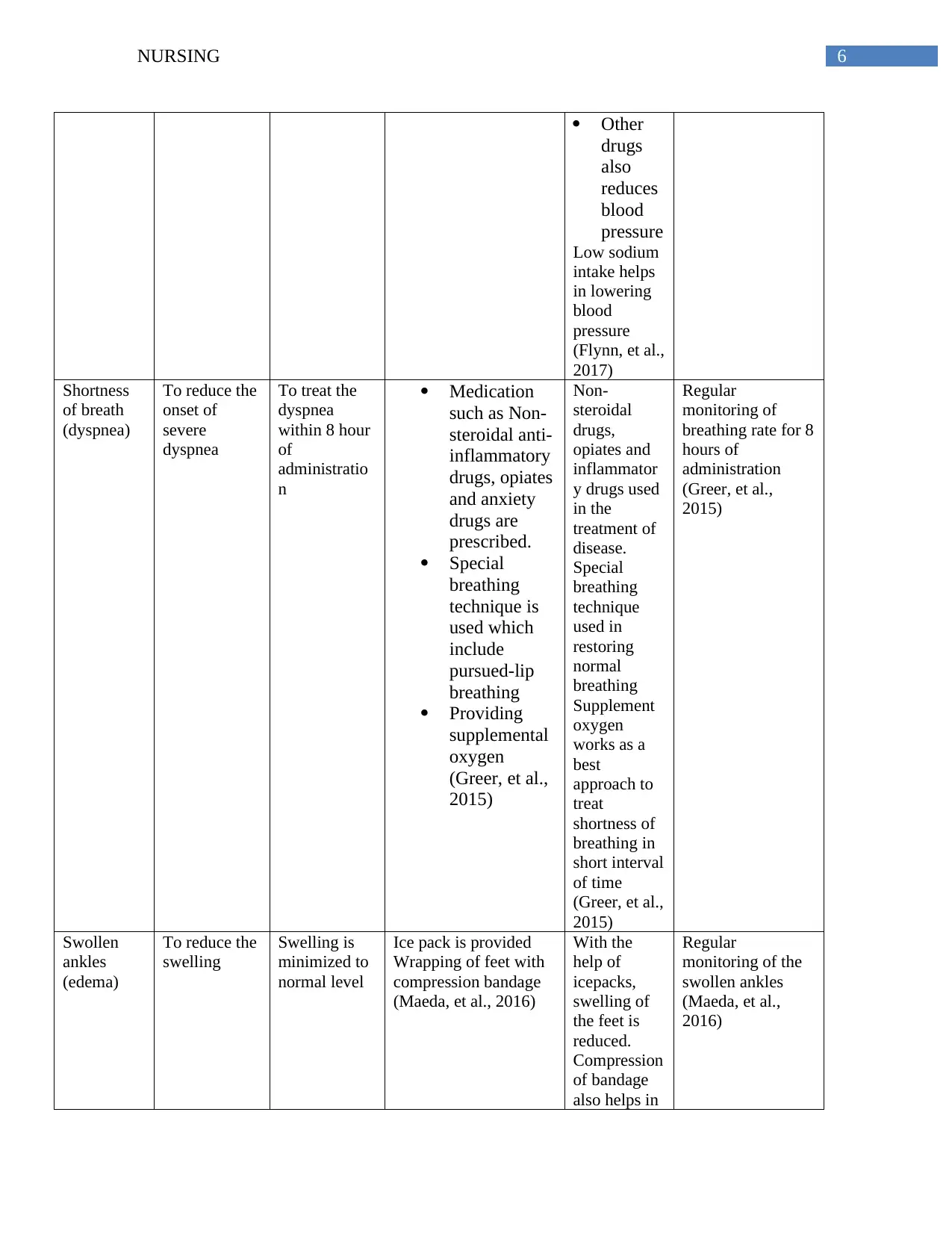
6NURSING
Other
drugs
also
reduces
blood
pressure
Low sodium
intake helps
in lowering
blood
pressure
(Flynn, et al.,
2017)
Shortness
of breath
(dyspnea)
To reduce the
onset of
severe
dyspnea
To treat the
dyspnea
within 8 hour
of
administratio
n
Medication
such as Non-
steroidal anti-
inflammatory
drugs, opiates
and anxiety
drugs are
prescribed.
Special
breathing
technique is
used which
include
pursued-lip
breathing
Providing
supplemental
oxygen
(Greer, et al.,
2015)
Non-
steroidal
drugs,
opiates and
inflammator
y drugs used
in the
treatment of
disease.
Special
breathing
technique
used in
restoring
normal
breathing
Supplement
oxygen
works as a
best
approach to
treat
shortness of
breathing in
short interval
of time
(Greer, et al.,
2015)
Regular
monitoring of
breathing rate for 8
hours of
administration
(Greer, et al.,
2015)
Swollen
ankles
(edema)
To reduce the
swelling
Swelling is
minimized to
normal level
Ice pack is provided
Wrapping of feet with
compression bandage
(Maeda, et al., 2016)
With the
help of
icepacks,
swelling of
the feet is
reduced.
Compression
of bandage
also helps in
Regular
monitoring of the
swollen ankles
(Maeda, et al.,
2016)
Other
drugs
also
reduces
blood
pressure
Low sodium
intake helps
in lowering
blood
pressure
(Flynn, et al.,
2017)
Shortness
of breath
(dyspnea)
To reduce the
onset of
severe
dyspnea
To treat the
dyspnea
within 8 hour
of
administratio
n
Medication
such as Non-
steroidal anti-
inflammatory
drugs, opiates
and anxiety
drugs are
prescribed.
Special
breathing
technique is
used which
include
pursued-lip
breathing
Providing
supplemental
oxygen
(Greer, et al.,
2015)
Non-
steroidal
drugs,
opiates and
inflammator
y drugs used
in the
treatment of
disease.
Special
breathing
technique
used in
restoring
normal
breathing
Supplement
oxygen
works as a
best
approach to
treat
shortness of
breathing in
short interval
of time
(Greer, et al.,
2015)
Regular
monitoring of
breathing rate for 8
hours of
administration
(Greer, et al.,
2015)
Swollen
ankles
(edema)
To reduce the
swelling
Swelling is
minimized to
normal level
Ice pack is provided
Wrapping of feet with
compression bandage
(Maeda, et al., 2016)
With the
help of
icepacks,
swelling of
the feet is
reduced.
Compression
of bandage
also helps in
Regular
monitoring of the
swollen ankles
(Maeda, et al.,
2016)
Paraphrase This Document
Need a fresh take? Get an instant paraphrase of this document with our AI Paraphraser
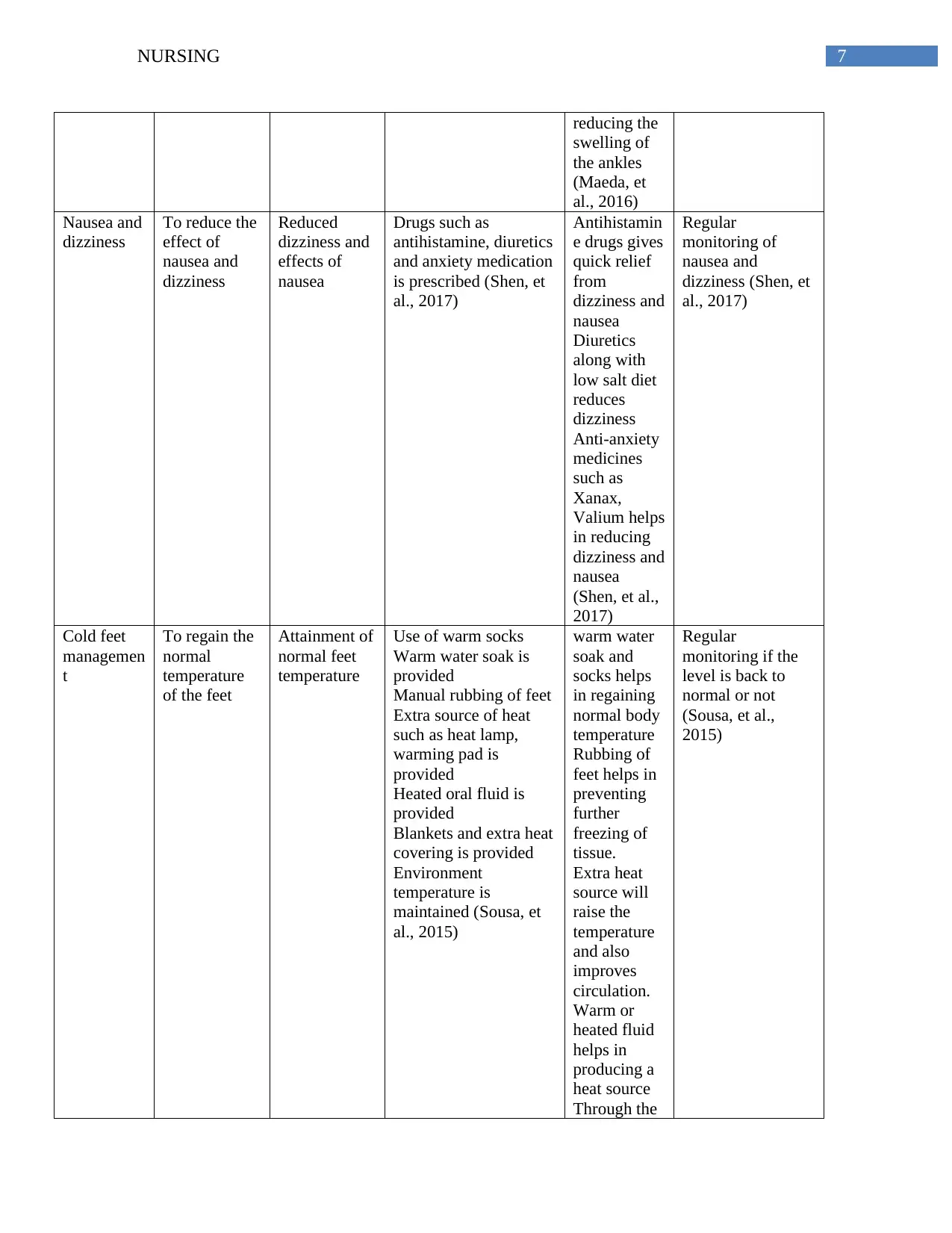
7NURSING
reducing the
swelling of
the ankles
(Maeda, et
al., 2016)
Nausea and
dizziness
To reduce the
effect of
nausea and
dizziness
Reduced
dizziness and
effects of
nausea
Drugs such as
antihistamine, diuretics
and anxiety medication
is prescribed (Shen, et
al., 2017)
Antihistamin
e drugs gives
quick relief
from
dizziness and
nausea
Diuretics
along with
low salt diet
reduces
dizziness
Anti-anxiety
medicines
such as
Xanax,
Valium helps
in reducing
dizziness and
nausea
(Shen, et al.,
2017)
Regular
monitoring of
nausea and
dizziness (Shen, et
al., 2017)
Cold feet
managemen
t
To regain the
normal
temperature
of the feet
Attainment of
normal feet
temperature
Use of warm socks
Warm water soak is
provided
Manual rubbing of feet
Extra source of heat
such as heat lamp,
warming pad is
provided
Heated oral fluid is
provided
Blankets and extra heat
covering is provided
Environment
temperature is
maintained (Sousa, et
al., 2015)
warm water
soak and
socks helps
in regaining
normal body
temperature
Rubbing of
feet helps in
preventing
further
freezing of
tissue.
Extra heat
source will
raise the
temperature
and also
improves
circulation.
Warm or
heated fluid
helps in
producing a
heat source
Through the
Regular
monitoring if the
level is back to
normal or not
(Sousa, et al.,
2015)
reducing the
swelling of
the ankles
(Maeda, et
al., 2016)
Nausea and
dizziness
To reduce the
effect of
nausea and
dizziness
Reduced
dizziness and
effects of
nausea
Drugs such as
antihistamine, diuretics
and anxiety medication
is prescribed (Shen, et
al., 2017)
Antihistamin
e drugs gives
quick relief
from
dizziness and
nausea
Diuretics
along with
low salt diet
reduces
dizziness
Anti-anxiety
medicines
such as
Xanax,
Valium helps
in reducing
dizziness and
nausea
(Shen, et al.,
2017)
Regular
monitoring of
nausea and
dizziness (Shen, et
al., 2017)
Cold feet
managemen
t
To regain the
normal
temperature
of the feet
Attainment of
normal feet
temperature
Use of warm socks
Warm water soak is
provided
Manual rubbing of feet
Extra source of heat
such as heat lamp,
warming pad is
provided
Heated oral fluid is
provided
Blankets and extra heat
covering is provided
Environment
temperature is
maintained (Sousa, et
al., 2015)
warm water
soak and
socks helps
in regaining
normal body
temperature
Rubbing of
feet helps in
preventing
further
freezing of
tissue.
Extra heat
source will
raise the
temperature
and also
improves
circulation.
Warm or
heated fluid
helps in
producing a
heat source
Through the
Regular
monitoring if the
level is back to
normal or not
(Sousa, et al.,
2015)
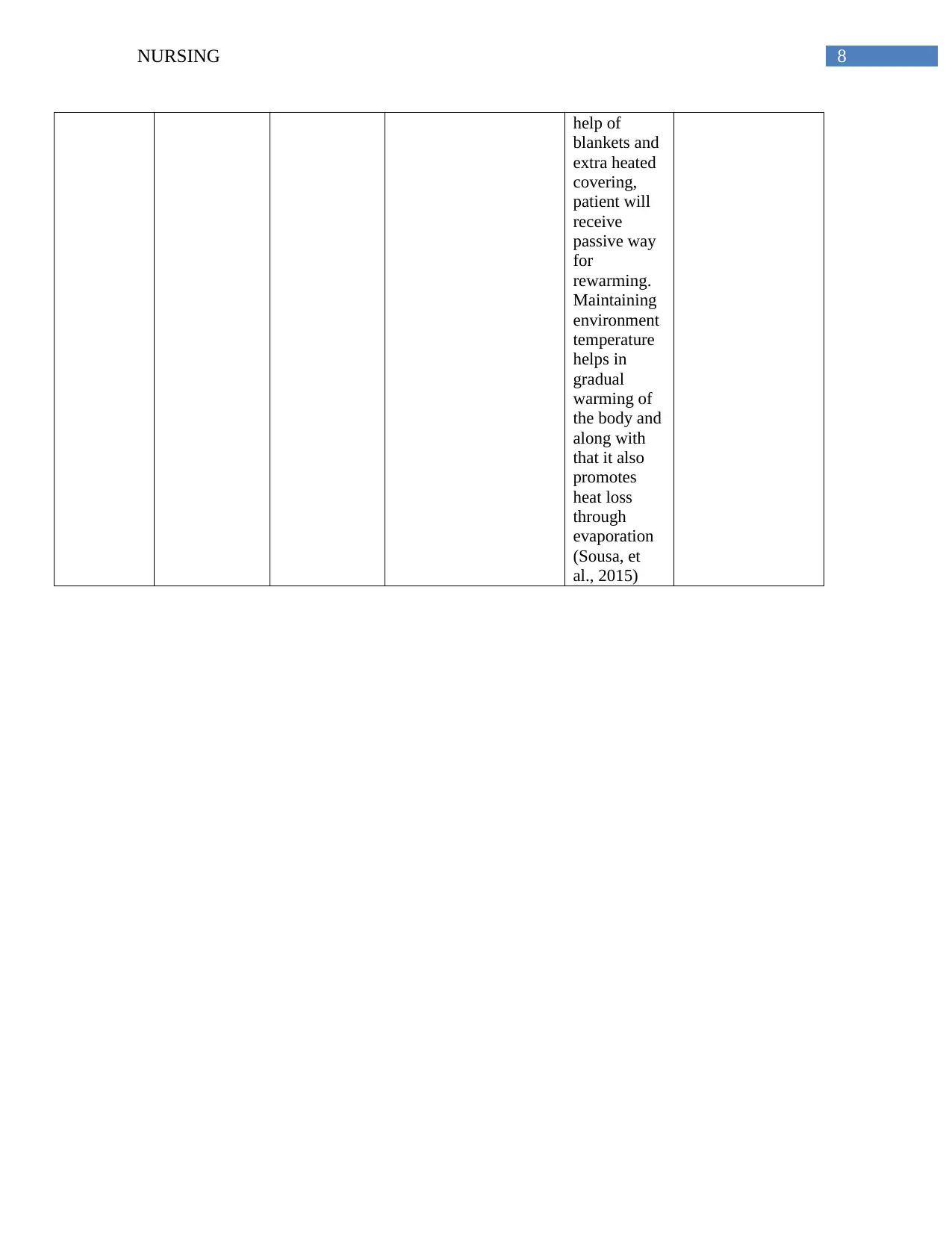
8NURSING
help of
blankets and
extra heated
covering,
patient will
receive
passive way
for
rewarming.
Maintaining
environment
temperature
helps in
gradual
warming of
the body and
along with
that it also
promotes
heat loss
through
evaporation
(Sousa, et
al., 2015)
help of
blankets and
extra heated
covering,
patient will
receive
passive way
for
rewarming.
Maintaining
environment
temperature
helps in
gradual
warming of
the body and
along with
that it also
promotes
heat loss
through
evaporation
(Sousa, et
al., 2015)
⊘ This is a preview!⊘
Do you want full access?
Subscribe today to unlock all pages.

Trusted by 1+ million students worldwide
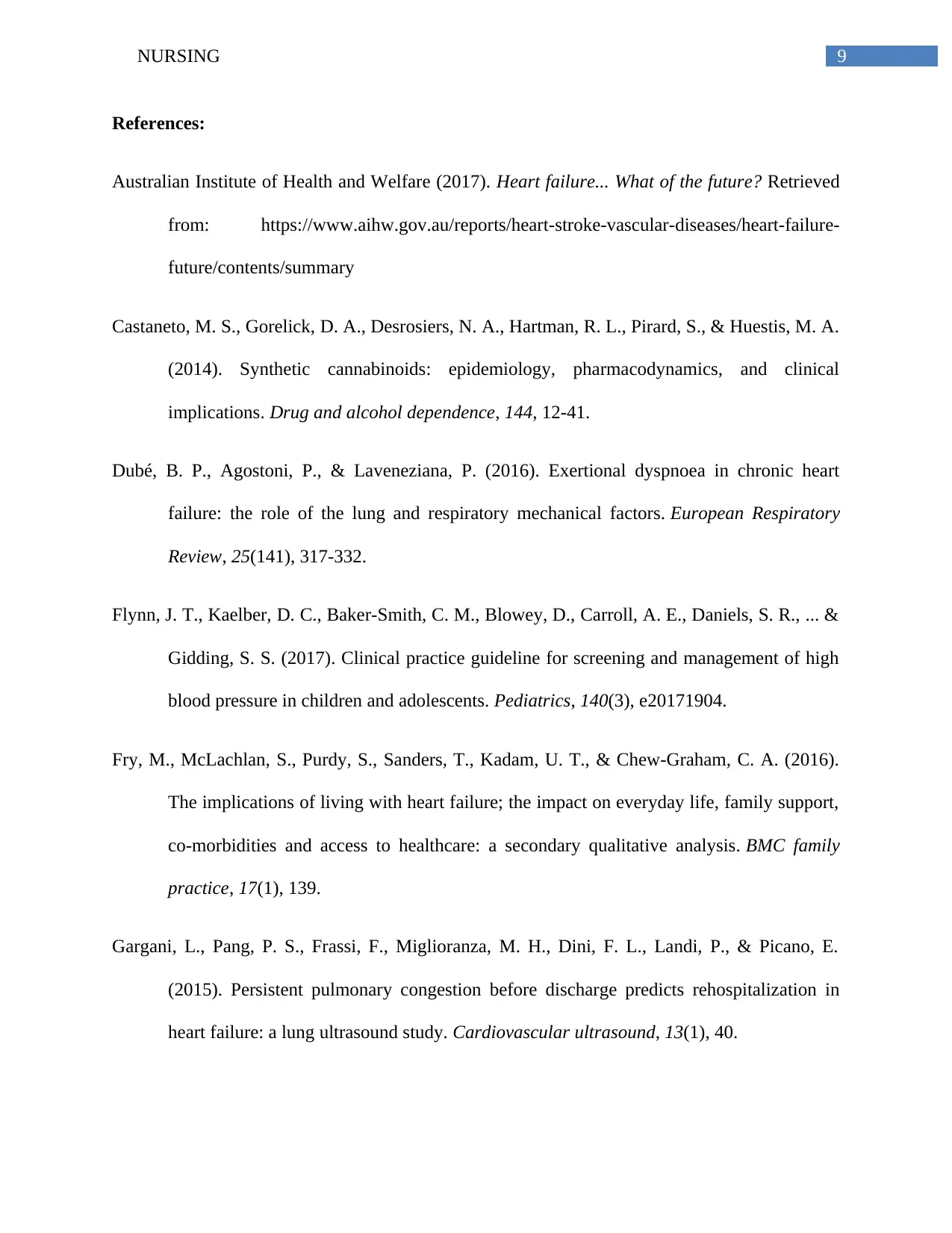
9NURSING
References:
Australian Institute of Health and Welfare (2017). Heart failure... What of the future? Retrieved
from: https://www.aihw.gov.au/reports/heart-stroke-vascular-diseases/heart-failure-
future/contents/summary
Castaneto, M. S., Gorelick, D. A., Desrosiers, N. A., Hartman, R. L., Pirard, S., & Huestis, M. A.
(2014). Synthetic cannabinoids: epidemiology, pharmacodynamics, and clinical
implications. Drug and alcohol dependence, 144, 12-41.
Dubé, B. P., Agostoni, P., & Laveneziana, P. (2016). Exertional dyspnoea in chronic heart
failure: the role of the lung and respiratory mechanical factors. European Respiratory
Review, 25(141), 317-332.
Flynn, J. T., Kaelber, D. C., Baker-Smith, C. M., Blowey, D., Carroll, A. E., Daniels, S. R., ... &
Gidding, S. S. (2017). Clinical practice guideline for screening and management of high
blood pressure in children and adolescents. Pediatrics, 140(3), e20171904.
Fry, M., McLachlan, S., Purdy, S., Sanders, T., Kadam, U. T., & Chew-Graham, C. A. (2016).
The implications of living with heart failure; the impact on everyday life, family support,
co-morbidities and access to healthcare: a secondary qualitative analysis. BMC family
practice, 17(1), 139.
Gargani, L., Pang, P. S., Frassi, F., Miglioranza, M. H., Dini, F. L., Landi, P., & Picano, E.
(2015). Persistent pulmonary congestion before discharge predicts rehospitalization in
heart failure: a lung ultrasound study. Cardiovascular ultrasound, 13(1), 40.
References:
Australian Institute of Health and Welfare (2017). Heart failure... What of the future? Retrieved
from: https://www.aihw.gov.au/reports/heart-stroke-vascular-diseases/heart-failure-
future/contents/summary
Castaneto, M. S., Gorelick, D. A., Desrosiers, N. A., Hartman, R. L., Pirard, S., & Huestis, M. A.
(2014). Synthetic cannabinoids: epidemiology, pharmacodynamics, and clinical
implications. Drug and alcohol dependence, 144, 12-41.
Dubé, B. P., Agostoni, P., & Laveneziana, P. (2016). Exertional dyspnoea in chronic heart
failure: the role of the lung and respiratory mechanical factors. European Respiratory
Review, 25(141), 317-332.
Flynn, J. T., Kaelber, D. C., Baker-Smith, C. M., Blowey, D., Carroll, A. E., Daniels, S. R., ... &
Gidding, S. S. (2017). Clinical practice guideline for screening and management of high
blood pressure in children and adolescents. Pediatrics, 140(3), e20171904.
Fry, M., McLachlan, S., Purdy, S., Sanders, T., Kadam, U. T., & Chew-Graham, C. A. (2016).
The implications of living with heart failure; the impact on everyday life, family support,
co-morbidities and access to healthcare: a secondary qualitative analysis. BMC family
practice, 17(1), 139.
Gargani, L., Pang, P. S., Frassi, F., Miglioranza, M. H., Dini, F. L., Landi, P., & Picano, E.
(2015). Persistent pulmonary congestion before discharge predicts rehospitalization in
heart failure: a lung ultrasound study. Cardiovascular ultrasound, 13(1), 40.
Paraphrase This Document
Need a fresh take? Get an instant paraphrase of this document with our AI Paraphraser
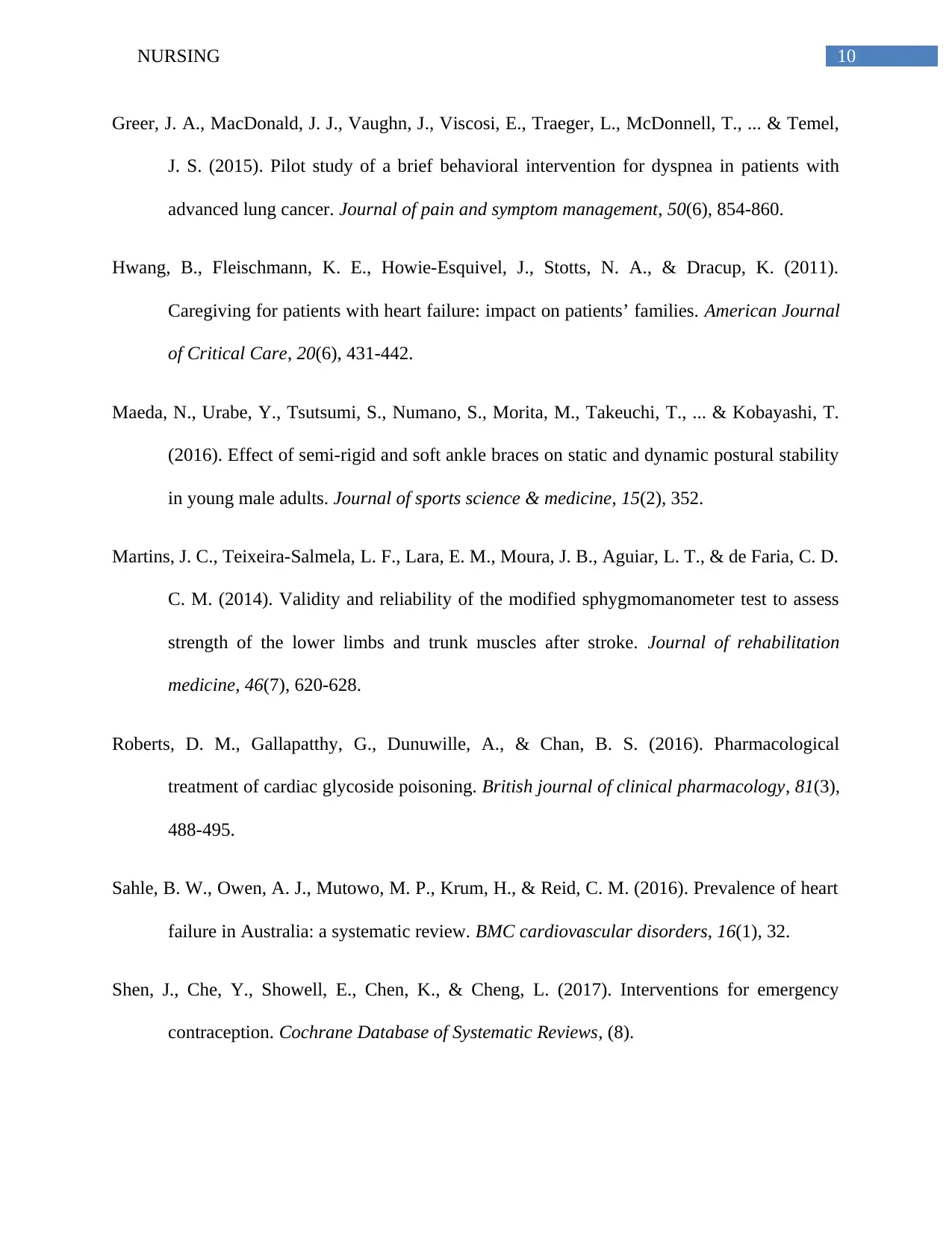
10NURSING
Greer, J. A., MacDonald, J. J., Vaughn, J., Viscosi, E., Traeger, L., McDonnell, T., ... & Temel,
J. S. (2015). Pilot study of a brief behavioral intervention for dyspnea in patients with
advanced lung cancer. Journal of pain and symptom management, 50(6), 854-860.
Hwang, B., Fleischmann, K. E., Howie-Esquivel, J., Stotts, N. A., & Dracup, K. (2011).
Caregiving for patients with heart failure: impact on patients’ families. American Journal
of Critical Care, 20(6), 431-442.
Maeda, N., Urabe, Y., Tsutsumi, S., Numano, S., Morita, M., Takeuchi, T., ... & Kobayashi, T.
(2016). Effect of semi-rigid and soft ankle braces on static and dynamic postural stability
in young male adults. Journal of sports science & medicine, 15(2), 352.
Martins, J. C., Teixeira-Salmela, L. F., Lara, E. M., Moura, J. B., Aguiar, L. T., & de Faria, C. D.
C. M. (2014). Validity and reliability of the modified sphygmomanometer test to assess
strength of the lower limbs and trunk muscles after stroke. Journal of rehabilitation
medicine, 46(7), 620-628.
Roberts, D. M., Gallapatthy, G., Dunuwille, A., & Chan, B. S. (2016). Pharmacological
treatment of cardiac glycoside poisoning. British journal of clinical pharmacology, 81(3),
488-495.
Sahle, B. W., Owen, A. J., Mutowo, M. P., Krum, H., & Reid, C. M. (2016). Prevalence of heart
failure in Australia: a systematic review. BMC cardiovascular disorders, 16(1), 32.
Shen, J., Che, Y., Showell, E., Chen, K., & Cheng, L. (2017). Interventions for emergency
contraception. Cochrane Database of Systematic Reviews, (8).
Greer, J. A., MacDonald, J. J., Vaughn, J., Viscosi, E., Traeger, L., McDonnell, T., ... & Temel,
J. S. (2015). Pilot study of a brief behavioral intervention for dyspnea in patients with
advanced lung cancer. Journal of pain and symptom management, 50(6), 854-860.
Hwang, B., Fleischmann, K. E., Howie-Esquivel, J., Stotts, N. A., & Dracup, K. (2011).
Caregiving for patients with heart failure: impact on patients’ families. American Journal
of Critical Care, 20(6), 431-442.
Maeda, N., Urabe, Y., Tsutsumi, S., Numano, S., Morita, M., Takeuchi, T., ... & Kobayashi, T.
(2016). Effect of semi-rigid and soft ankle braces on static and dynamic postural stability
in young male adults. Journal of sports science & medicine, 15(2), 352.
Martins, J. C., Teixeira-Salmela, L. F., Lara, E. M., Moura, J. B., Aguiar, L. T., & de Faria, C. D.
C. M. (2014). Validity and reliability of the modified sphygmomanometer test to assess
strength of the lower limbs and trunk muscles after stroke. Journal of rehabilitation
medicine, 46(7), 620-628.
Roberts, D. M., Gallapatthy, G., Dunuwille, A., & Chan, B. S. (2016). Pharmacological
treatment of cardiac glycoside poisoning. British journal of clinical pharmacology, 81(3),
488-495.
Sahle, B. W., Owen, A. J., Mutowo, M. P., Krum, H., & Reid, C. M. (2016). Prevalence of heart
failure in Australia: a systematic review. BMC cardiovascular disorders, 16(1), 32.
Shen, J., Che, Y., Showell, E., Chen, K., & Cheng, L. (2017). Interventions for emergency
contraception. Cochrane Database of Systematic Reviews, (8).
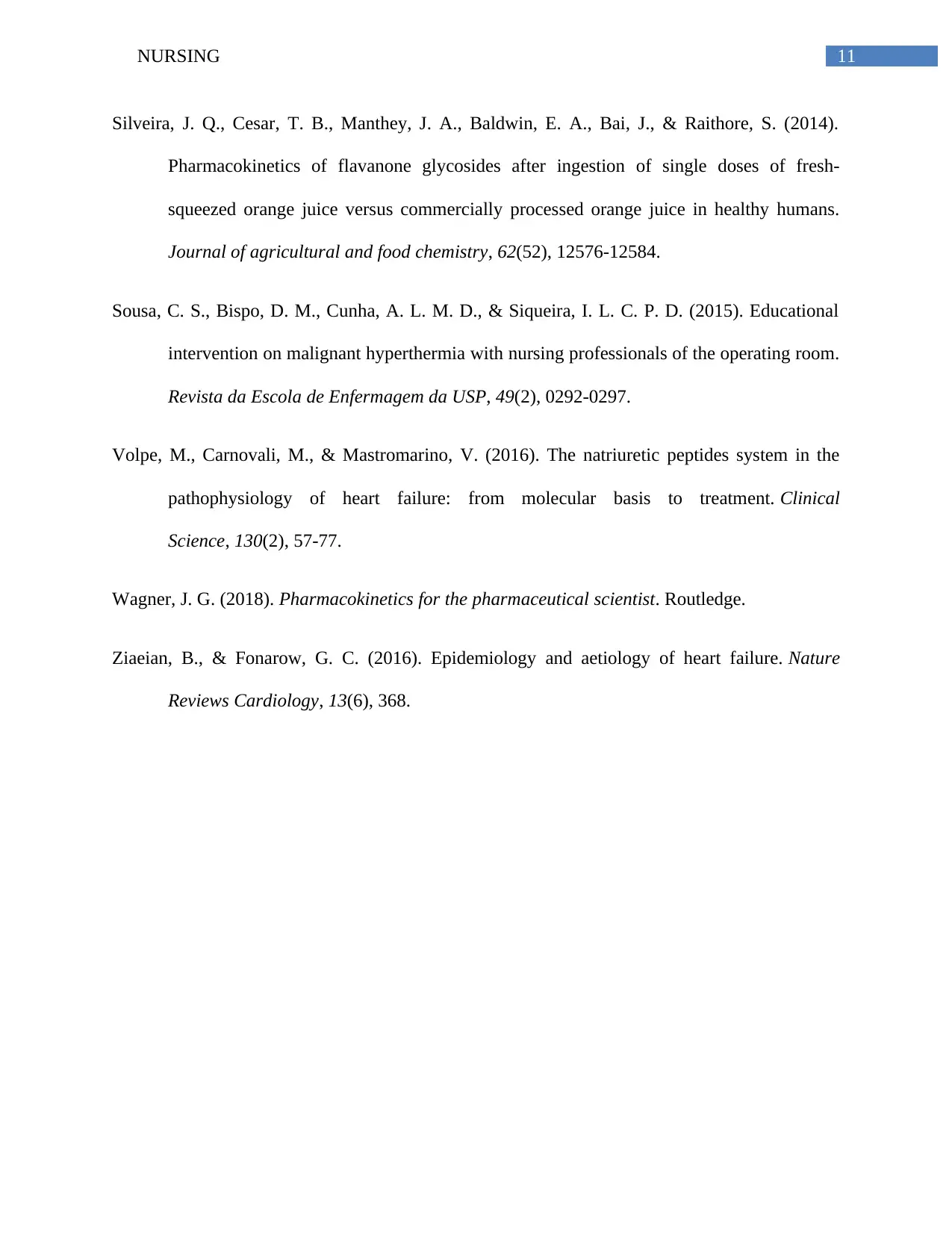
11NURSING
Silveira, J. Q., Cesar, T. B., Manthey, J. A., Baldwin, E. A., Bai, J., & Raithore, S. (2014).
Pharmacokinetics of flavanone glycosides after ingestion of single doses of fresh-
squeezed orange juice versus commercially processed orange juice in healthy humans.
Journal of agricultural and food chemistry, 62(52), 12576-12584.
Sousa, C. S., Bispo, D. M., Cunha, A. L. M. D., & Siqueira, I. L. C. P. D. (2015). Educational
intervention on malignant hyperthermia with nursing professionals of the operating room.
Revista da Escola de Enfermagem da USP, 49(2), 0292-0297.
Volpe, M., Carnovali, M., & Mastromarino, V. (2016). The natriuretic peptides system in the
pathophysiology of heart failure: from molecular basis to treatment. Clinical
Science, 130(2), 57-77.
Wagner, J. G. (2018). Pharmacokinetics for the pharmaceutical scientist. Routledge.
Ziaeian, B., & Fonarow, G. C. (2016). Epidemiology and aetiology of heart failure. Nature
Reviews Cardiology, 13(6), 368.
Silveira, J. Q., Cesar, T. B., Manthey, J. A., Baldwin, E. A., Bai, J., & Raithore, S. (2014).
Pharmacokinetics of flavanone glycosides after ingestion of single doses of fresh-
squeezed orange juice versus commercially processed orange juice in healthy humans.
Journal of agricultural and food chemistry, 62(52), 12576-12584.
Sousa, C. S., Bispo, D. M., Cunha, A. L. M. D., & Siqueira, I. L. C. P. D. (2015). Educational
intervention on malignant hyperthermia with nursing professionals of the operating room.
Revista da Escola de Enfermagem da USP, 49(2), 0292-0297.
Volpe, M., Carnovali, M., & Mastromarino, V. (2016). The natriuretic peptides system in the
pathophysiology of heart failure: from molecular basis to treatment. Clinical
Science, 130(2), 57-77.
Wagner, J. G. (2018). Pharmacokinetics for the pharmaceutical scientist. Routledge.
Ziaeian, B., & Fonarow, G. C. (2016). Epidemiology and aetiology of heart failure. Nature
Reviews Cardiology, 13(6), 368.
⊘ This is a preview!⊘
Do you want full access?
Subscribe today to unlock all pages.

Trusted by 1+ million students worldwide
1 out of 12
Related Documents
Your All-in-One AI-Powered Toolkit for Academic Success.
+13062052269
info@desklib.com
Available 24*7 on WhatsApp / Email
![[object Object]](/_next/static/media/star-bottom.7253800d.svg)
Unlock your academic potential
Copyright © 2020–2026 A2Z Services. All Rights Reserved. Developed and managed by ZUCOL.




